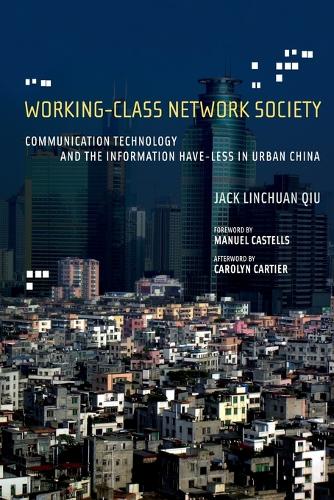
Working-Class Network Society: Communication Technology and the Information Have-Less in Urban China
(Paperback)
Publishing Details
Working-Class Network Society: Communication Technology and the Information Have-Less in Urban China
By (Author) Jack Linchuan Qiu
Foreword by Manuel Castells
Afterword by Carolyn Cartier
MIT Press Ltd
MIT Press
19th September 2023
United States
Classifications
Tertiary Education
Non Fiction
Communication studies
Impact of science and technology on society
303.48330951
Physical Properties
Paperback
320
Width 152mm, Height 229mm
454g
Description
An examination of how the availability of low-end information and communication technology has provided a basis for the emergence of a working-class network society in China. The idea of the "digital divide," the great social division between information haves and have-nots, has dominated policy debates and scholarly analysis since the 1990s. In Working-Class Network Society, Jack Linchuan Qiu describes a more complex social and technological reality in a newly mobile, urbanizing China. Qiu argues that as inexpensive Internet and mobile phone services become available and are closely integrated with the everyday work and life of low-income communities, they provide a critical seedbed for the emergence of a new working class of "network labor" crucial to China's economic boom. Between the haves and have-nots, writes Qiu, are the information "have-less"- migrants, laid-off workers, micro-entrepreneurs, retirees, youth, and others, increasingly connected by cybercafes, prepaid service, and used mobile phones. A process of class formation has begun that has important implications for working-class network society in China and beyond. Qiu brings class back into the scholarly discussion, not as a secondary factor but as an essential dimension in our understanding of communication technology as it is shaped in the vast, industrializing society of China. Basing his analysis on his more than five years of empirical research conducted in twenty cities, Qiu examines technology and class, networked connectivity and public policy, in the context of massive urban reforms that affect the new working class disproportionately. The transformation of Chinese society, writes Qiu, is emblematic of the new technosocial reality emerging in much of the Global South.
Reviews
[A] fascinating picture of a hitherto almost unknown phenomenon.--Jens Damm, The China Journal--
Author Bio
Jack Linchuan Qiu is Assistant Professor at the School of Journalism and Communication at Chinese University of Hong Kong. He is a coauthor (with Manuel Castells, Mireia Fernandez-Ard vol, and Araba Sey) of Mobile Communication and Society- A Global Perspective (MIT Press, 2006). Manuel Castells is Professor of Communication and the Wallis Annenberg Chair in Communication Technology and Society at the Annenberg School for Communication, University of Southern California, as well as Professor Emeritus of Sociology and Planning at the University of California, Berkeley, Research Professor at the Open University of Catalonia, and Marvin and Joanne Grossman Distinguished Visiting Professor of Technology and Society at MIT. He is the author of, among other books, the three-volume work The Information Age- Economy, Society, and Culture.
